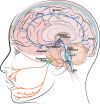Modulation of amygdala activity for emotional faces due to botulinum toxin type A injections that prevent frowning
- PMID: 36849797
- PMCID: PMC9971043
- DOI: 10.1038/s41598-023-29280-x
Modulation of amygdala activity for emotional faces due to botulinum toxin type A injections that prevent frowning
Abstract
According to the facial feedback hypothesis, when we see an angry or happy face, we contract or flex the relevant muscles to recreate the expression to assist in identifying and experiencing the emotion reflected. We investigated the facial feedback hypothesis by using botulinum toxin type A (onabotulinumtoxinA; onabotA) injections to induce temporary paralysis in the glabellar muscles (responsible for frowning) and measured functional brain activity during the processing of emotional faces. Ten females viewed pictures of happy and angry faces during two functional magnetic resonance imaging (fMRI) scan sessions: one prior (Pre) to onabotA and one following (Active) onabotA injections. We found Pre vs. Active onabotA modulation of activity in the amygdala for both happy and angry faces, as well as modulation of activity in the fusiform gyrus for happy faces. Consistent with our predictions, preventing frowning through inhibition of glabellar muscle contraction altered amygdala processing for emotional faces. The modulation of amygdala and fusiform gyrus activity following onabotA may reflect compensatory processes in a neuroanatomical circuit involved in emotional processing that is engaged when facial feedback is impaired. These data contribute to a growing literature suggesting that inhibition of glabellar muscle contraction alters neural activity for emotional processing.Clinical Trials.gov registration number: NCT03373162.
© 2023. The Author(s).
Conflict of interest statement
This study was sponsored by a grant from Allergan, an AbbVie Company (grant number ITT-00972), awarded to Dr. Craig Stark. Dr. Mitchell Brin, an author on this study, is an employee of AbbVie, and receives stock or stock options in AbbVie. The other authors have no competing interests.
Figures




References
-
- Jäncke L. Facial EMG in an anger-provoking situation: individual differences in directing anger outwards or inwards. Int. J. Psychophysiol. Off. J. Int. Organ. Psychophysiol. 1996;23:207–214. - PubMed
Publication types
MeSH terms
Substances
Associated data
LinkOut - more resources
Full Text Sources
Medical

